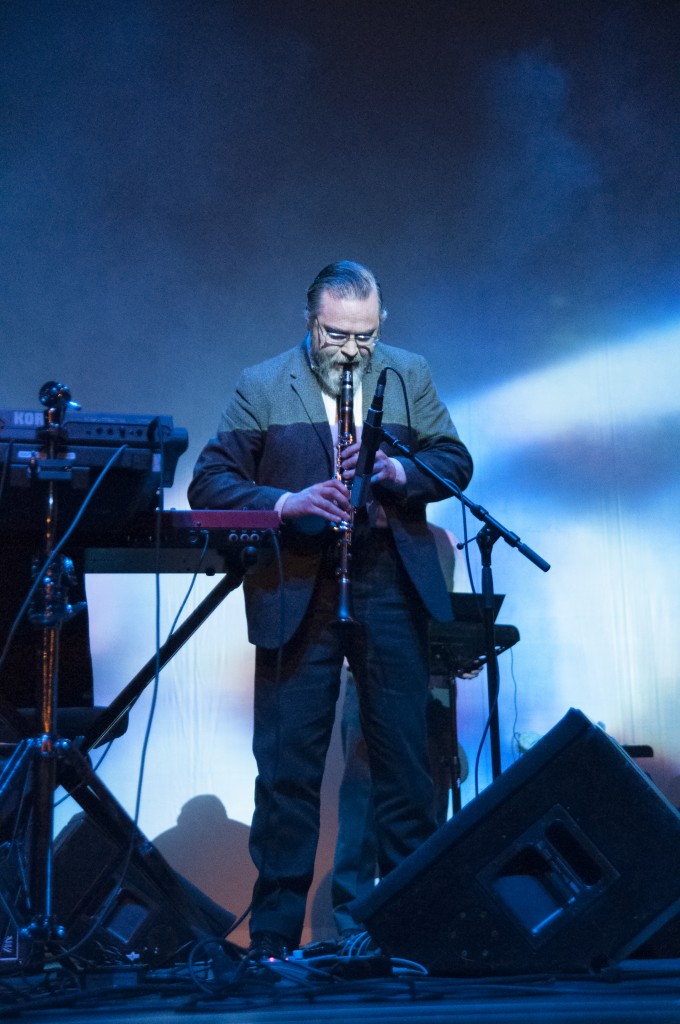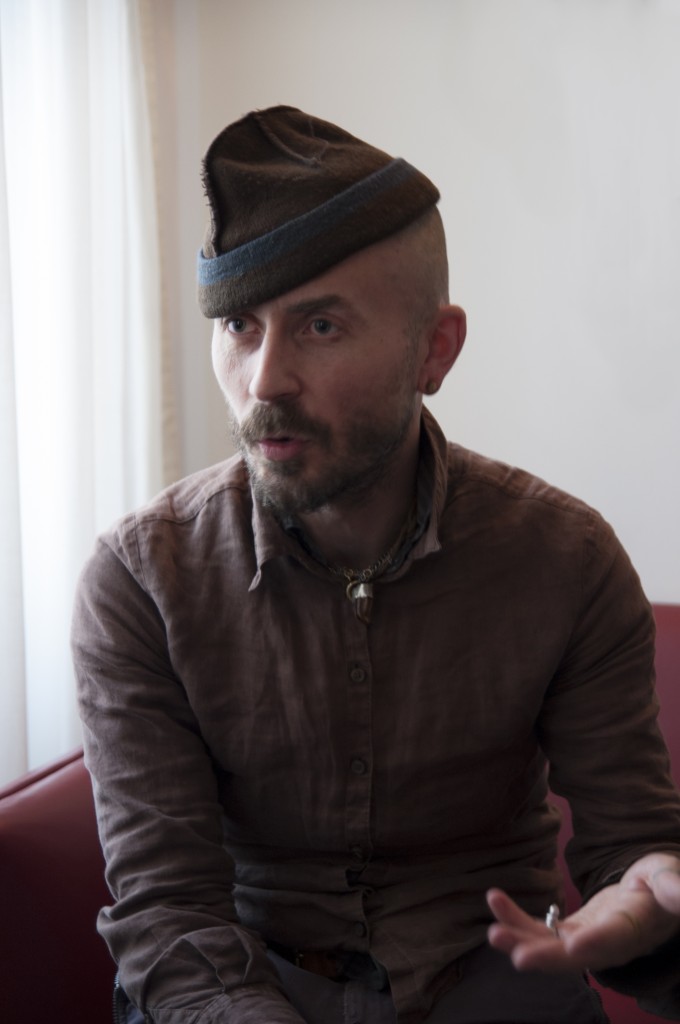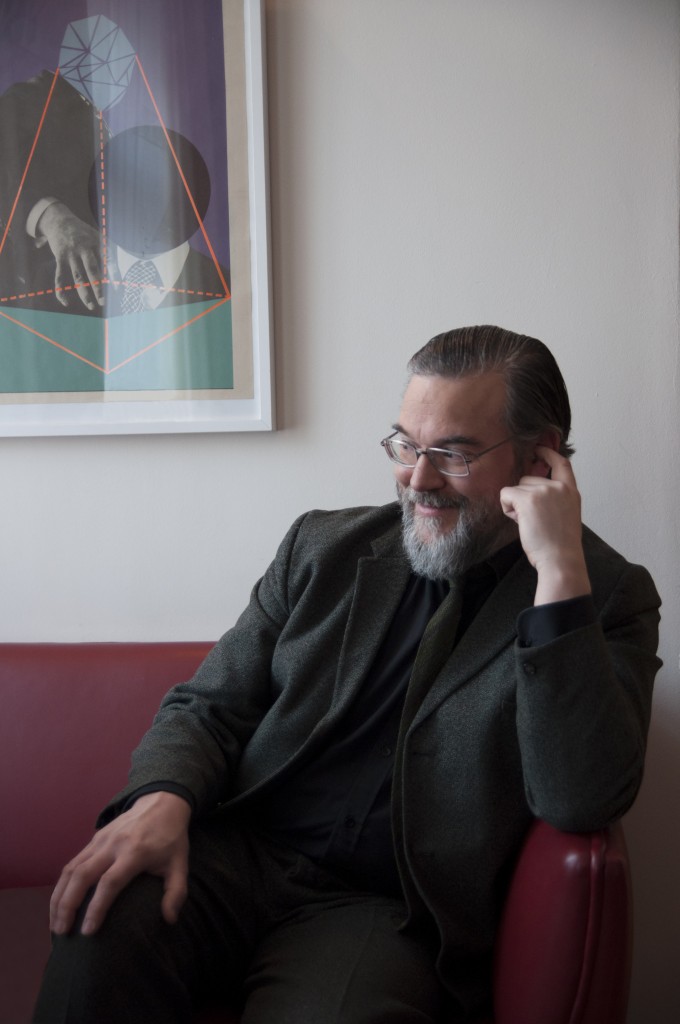Since 1999 the two have been musically active under the name Cyclobe. Their live performances are almost spiritual experiences: a total of six people stand on stage, playing instruments like the hurdy gurdy, bodhrán drums or bagpipes; visual support is provided by the filmic works of English director David Larcher.
Cyclobe performed one of these rare live gigs — their fourth ever — at this year’s CTM festival . Cyclobe seems to defy the prevailing definition of time. That’s at least the impression left when the two joined Samuel Savenberg in conversation a day after the concert.
Stephen Thrower How did it actually sound in the space? We had a somewhat special monitor setting on the stage that we weren’t completely satisfied with. That’s why it was hard for us to tell how it sounded in the hall. Well, I probably have to wait until I can hear the recordings on our mixer.
Samuel Savenberg I thought it was great. With such a large and unusual arsenal of instruments I did find it difficult to distinguish between them. But it was a very impressive wall of sound.
Ossian Brown Musical instruments like the hurdy gurdy, for example, are also difficult for us to pick out. We try to unconsciously embed them in the sound. In this regard it was also conscious in a way. But at yesterday’s concert we also had a volume limit.
ST That didn’t make it very easy for us. With the flatter sounds we were already at our upper limit when
OB It’s funny: Up until now we haven’t played live much at all — only four concerts in all. Whereby the first wasn’t with a six-person band. Somehow everything became bigger.
ST And more complicated.
OB We all play more than one instrument.
ST Up to five each, to be exact. The sound check always lasts somewhat longer than normal. By the time each instrument has emitted some sort of noise…
OB …the sound check is already over! Although we could still use a good four hours at that point. [Laughs] We’re definitely not the easiest band, in that regard.
SS That was your fourth concert in 15 years?
ST Yes, although until 2006 or 2007 we absolutely never played live.
OB We had never really considered it.
ST Cyclobe always took place at home in a shared studio. That means we had incredible technical possibilities. We could add details layer by layer to the tracks, and we didn’t have to think about translating the tracks for the stage. There were simply no limits. When we needed to use a specific instrument, we looked for that instrument and a person who could play it. Or we cobbled together field recordings for as long as it took to get the sound that we had imagined. To then come up with a stage show for a group of people seemed too daunting. Because than you’d have to start reducing each song to its bare bones. “We can’t do that, or that, because we’re missing the corresponding instrument.” And so on. Once you’ve gotten down to the skeleton of the composition, so to speak, it’s also not much fun anymore. This has just recently changed with the current live band. In the sense of, “Ah, wait. This does work!” We finally have enough people on stage. And they understand what we’re trying to do.
OB Our band is made up of good friends. We trust them.
ST Although this doesn’t make our development any faster. It’s not as if we wouldn’t have known enough session or studio musicians before. They just
OB Maybe it’s also important to mention that for a long time Cyclobe was just our project. Very intimate and personal; part of our relationship.
SS Did playing together with others change your production methods?
ST We definitely have new options. We could begin to work on the concrete realization of a piece much sooner, saying, “This we’ll play as a band, this section here will be played live only by this person.”
OB There are different possibilities that need to be divided between a fixed number of people. Sometimes I’d like to have a few more people for the stage. There are situations when you only need one extra person to come on stage for a minute, bang on something, and then disappear.
ST I could use a third hand. For certain things on the keyboard it would be very practical.
OB But to come back to the question: We’ve also reworked old tracks with the new musicians.
ST We’ve also begun to try out new things during concert rehearsals — as a band, not just the two of us. One thing we’ve observed is that quieter stretches are often built upon. So in a spot where someone’s not needed, the impulse is to suddenly start to improvise. That’s probably always the case when a lot of people are making music together in a room. A lot of new, interesting things come about in this way.
SS But is that not strange for you? Especially since at the beginning Cyclobe was a very personal project for you both?
OB It’s a completely new situation for us, yeah. But that’s how it is now. We’re suddenly among other people! [Laughter] But in all honesty: It’s extremely motivating to get a direct answer to what you make. From fellow musicians and the public.
SS To summarize, you could say that the main reason you so seldomly appear live has to do with the problem of realization? You wouldn’t necessarily guess this when seeing where and in which frameworks you’ve played before… Or are you very picky when it comes to which concert engagements to accept?
OB After the first concert I didn’t think that we would ever play before the public again. There was then a long pause — of almost seven years — before we played another concert.
ST Time somehow goes by too quickly for us. People come to us and say that we play live so irregularly. I’m always a bit irritated with this, because it doesn’t seem so to me. But one reason for this is probably that in the end, there are two of us. We [points to Ossian and himself] are Cyclobe. And we have to be in agreement. Now, two is an even number, which means that democratic decisions are not always easy. At the same time you don’t always want to be convincing the other person.
OB And I always have these episodes of…
ST …teeth-gnashing frustration.
OB Yeah.
SS How do you go about choosing the film sequences? You use material from many different, sometimes notable filmmakers.
OB Certain elements were set from the beginning. For example, film sequences from David Larcher’s film Mare’s Tail.
ST David is a hugely under-appreciated genius in English film — especially in England itself. He has a somewhat notorious reputation. He’s a radical purist, a film-purist, so to speak. He didn’t want his films to appear on DVD, because to him the format seemed inappropriate for film — he’s an uncompromising artist. We ourselves were surprised, but we quickly came to an understanding with him. At the beginning we didn’t even trust ourselves to approach him. Someone who has such a precise vision of how his films should be presented. One thinks twice about using parts of his films — ripped out of context — to play in the background of a concert. But then we dared to ask him. David was very polite and said it wasn’t a problem at all: “Do what you want!”
OB In the ’60s he worked with Pink Floyd. So he already had experience in this area. The visual is extremely important to us.
Also, our music isn’t suitable for running wildly around the stage. Not to mention that because of the “instrumentarium” there isn’t much space to move around in. But we still want to offer something visual. Stephen Thrower
ST: Also, our music isn’t suitable for running wildly around the stage. Not to mention that because of the “instrumentarium” there isn’t much space to move around in. But we still want to offer something visual. On the other side, almost no concert is without visuals. And I think that our audience also finds our instrumentation exciting to watch. We try as best we can to keep everything in balance.
OB Personally I don’t think that we’re dependent on the films. I like the idea of working without them altogether too. Especially because it’s become so commonplace.
SS It seemed to all work well together. A compact liaison, where the film and sound complemented each other well. It wasn’t just a concert where the band stands in front and a screen is in back.
ST Intuition is always an important factor. You always have to be careful when trying to fit movement and sound to one another. If it’s too synchronous, it usually becomes boring. And then the whole thing seems like a theater production with bad sound effects. We simply try a lot of things out, happy to experiment and work spontaneously. But that can take time, since it’s definitely a process of trial and error.
OB For me, a performance is successful when we manage to load our emotion into the work, and with that to create an atmosphere that can change the perception of what’s happening all around.
ST That’s one of the best things about music as an art form. Everything happens quickly. You can affect the mood of a room very quickly.
OB Noise itself doesn’t make a statement, but that’s just why it can effect people in so many different ways.
ST It works especially well with instrumental music, because it isn’t affected by language. That means people hear the music and only the music.
OB There’s nothing one can do but take in the music.
ST That’s also a reason why bad music can be so painful. You go shopping and are inundated non-stop by music you don’t like. And you can’t escape it.
OB Even with good music. I honestly don’t like to listen to music just in passing.
SS Since we’re already talking about music itself: Did you actually get to see other concerts here at CTM?
ST Unfortunately not. It’s one of the things that happens when you play a festival like this. There’s a huge selection of interesting things, but as a performer you don’t have much time.
OB You want to concentrate on your own thing, on the concert. But I do want to mention that we were very happy to play with Lichens last evening. We like his art and see a lot of similarities in his way of going about things and “spirit.” Very transcendental and intense.
SS I’m partly asking these questions because the festival’s theme this year, “Dis-Continuity,” had a certain vibe. There was a conversation with and about technology and its impact — which is now also happening in other places. “Post-Digital” is one of the terms used. Cyclobe — as well as Lichens — don’t really seem to fit in here, which to me is a refreshing change…
ST I struggle with this development. I do inform myself about some of the themes and there are always viewpoints or artists that I find exciting. Aside from this,
OB I don’t necessarily want to take on the role of the culture pessimist, but sometimes I do think that it’s a shame how obsessed people are with the future and the new.
I mean, because Marcel Duchamp placed a toilet in an art gallery in the ‘20s doesn’t mean that modern art was finished. Stephen Thrower
ST: One thing that is always reoccurring in different art movements is that as soon as the edges and chasms have been located one runs directly to these. I can very well understand the allure, but I can’t completely understand it when only borders, taboos and the like are sought after. When a conversation with what has already happened no longer takes place, because from the very beginning it’s been deemed old hat. It’s not very conducive to creativity. I mean, because Marcel Duchamp placed a toilet in an art gallery in the ‘20s doesn’t mean that modern art was finished.
SS Bands like Coil, in which you both were members, and other projects from England’s industrial area had something radical about them. They also had a provocative effect. I would have thought that the theme of border-exploration certainly played a role?
OB Clearly it was also about breaking taboos and borders. But it was never about ignoring the past. And I believe that people often underestimate Coil’s humorous side — and the fact that we often just tried out what we wanted to. There was much less of a concept or manifesto behind it than there often was, and is, conjectured to be. The same thing goes for Cyclobe: We’re looking for suitable possibilities to reach what we think is right for the Cyclobe monster. Simple as that.
SS What’s interesting is that in spite of this there are still many younger producers, as well as musicians, who’s references are exactly to this scene — your scene, if you will. At the same time they often represent radical claims and in general look critically upon retro-kitsch… Do you actually hear about it when new acts are based on Coil, Nurse With Wound or Throbbing Gristle? Does it interest you at all?
OB I have no idea… [Laughs] I never read about music.
ST Right now I can’t think of anyone who I’ve recently met who’s said to me that Coil was his inspiration.
OB I’m probably not interested enough. We simply don’t come in contact with the producers — when there are producers. But it’s nice to hear that you could have somehow, in some way, inspired someone else.
SS Where do you get your inspiration?
ST Truthfully? I go into the music studio, sit at whichever instrument and start to play and… [Snaps his fingers.]
OB My approach is to grab the hurdy gurdy and begin to play.
ST I sit at our house, downstairs, and listen to Ossian playing. In the next moment I run screaming up the stairs: “That’s good! Play it again! Record!” [Laughter] I know there are different opinions, but it is a little bit like so: You can wait and wait, read theories in the hope of finding the method that will lead to the desired result. That can work, but the simplest way seems to me to be the most obvious: Just playing; even if these days it sounds banal. I’m always coming up with terrible ideas, bad sound sequences. Then Ossian comes in screaming and says I should finally stop.
OB Well, when you’re woken up at 4… because of this horrible noise… [Laughs]
ST I’m saving all of that for a side project.
We let things rest until we’ve found the tiny decisive detail that completes the composition. That’s more preferable to us than to work against time and to produce music that in our eyes isn’t complete. Ossian Brown
OB: We find ourselves in a situation where we’re working on different projects and tracks over a long long time period. For the next album we have a few tracks that in their original forms are almost seven years old. Over time they’ve been taken apart, added to, shortened… At some point you’re left with something completely new. Maybe it becomes four separate tracks instead of one. We’re always reaching the point where we don’t really know where we want to go and how we should continue. But we don’t compromise in these situations. And we don’t have any time pressure. We let things rest until we’ve found the tiny decisive detail that completes the composition. That’s more preferable to us than to work against time and to produce music that in our eyes isn’t complete.
ST That’s just the way we work. We have had to work under deadlines, and to a certain degree it makes sense. But it’s also very frustrating when one’s creativity has to be trimmed in this way. When one’s artistic decisions are made against a ticking clock, it leads to a lot of mutual yelling and slamming of doors.


